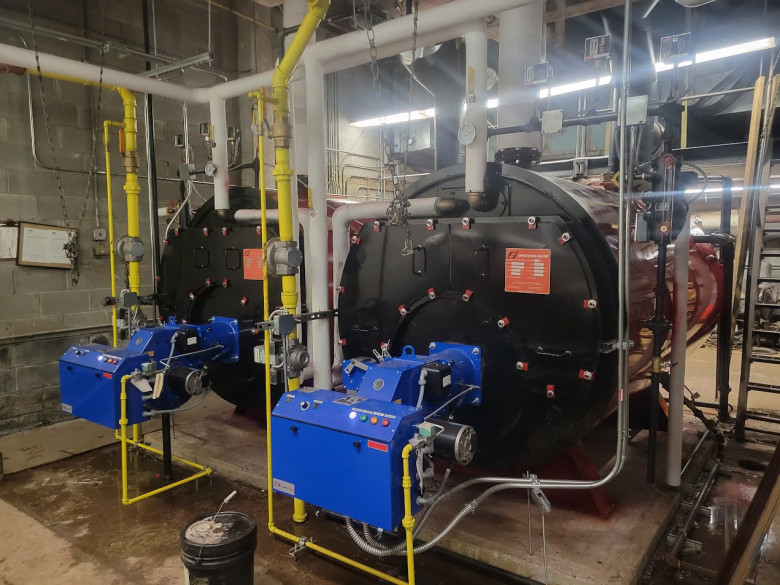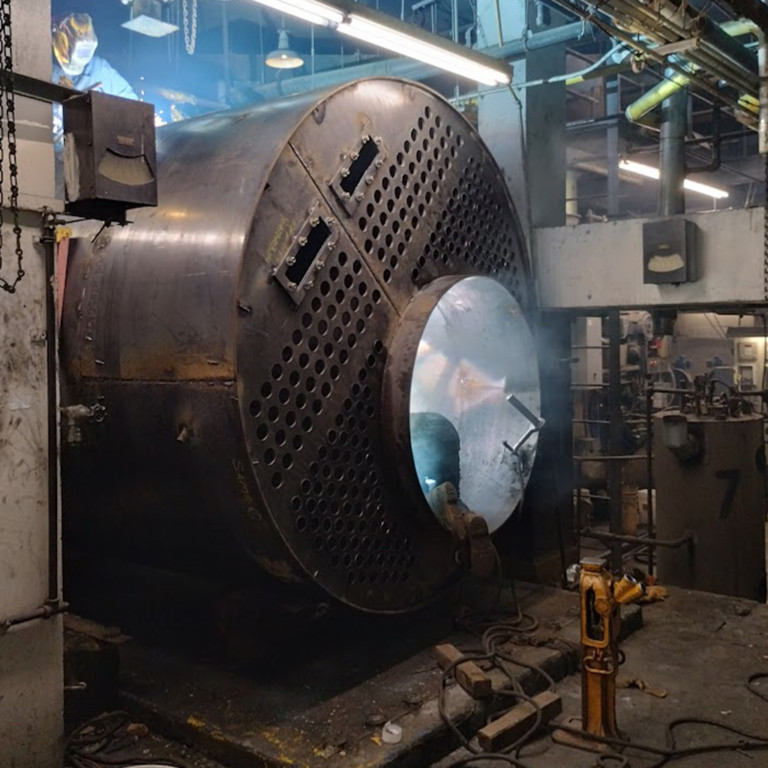views
Choosing the proper boiler machine is a pivotal choice for any enterprise, impacting everything from operational efficiency and safety to long-time period prices and occupant comfort. The most commonplace styles of business boilers—steam and warm water—each offer distinct benefits and challenges. Understanding their variations, packages, execs, and cons will help you make a knowledgeable preference that aligns with your facility’s needs.
Understanding the Basics: How Do Steam and Hot Water Boilers Work?
Steam Boilers:
Steam boilers warmness water to its boiling factor, developing steam that travels through pipes to radiators or system system. The steam releases its warmth because it condenses again into water, which returns to the boiler to be reheated. This cycle enables fast and effective warmness delivery, making steam boilers suitable for traumatic applications.
Hot Water Boilers:
Hot water boilers, additionally known as hydronic structures, heat water to a hard and fast temperature under boiling. The heated water circulates via a closed loop of pipes and radiators, shifting warmth to the constructing or technique. Once cooled, the water returns to the boiler for reheating, creating a continuous, managed heating cycle.
Key Differences at a Glance

Pros and Cons of Steam Boilers
Advantages:
-
High Heat-Carrying Capacity: Steam’s capability to carry more heat according to unit mass than hot water permits for rapid and powerful heating, especially in big, multi-story homes or business settings where excessive temperatures are required.
-
Effective for Large Spaces: Steam boilers are well-ideal for applications that demand sizeable warmness over large areas or require excessive process temperatures, along with manufacturing, food processing, and strength generation3.
-
Consistent Heating: When nicely maintained, steam structures can supply regular and even warmth, critical for certain business processes2.
Disadvantages:
-
Safety Concerns: Steam systems operate at better pressures, increasing the threat of leaks, burns, or even explosions if now not nicely maintained. Safety protocols and everyday inspections are essential.
-
Higher Maintenance Needs: Steam boilers have more complex components (steam traps, strain regulators, condensate return lines) that require normal interest and are more susceptible to malfunctions.
-
Noise: Steam transferring via pipes frequently creates hissing or banging sounds, which can be disruptive in workplace or residential environments.
-
Temperature Control: Achieving precise temperature manipulate is greater challenging with steam, as strain and distribution can fluctuate.
-
Potential for Uneven Heating: Steam might not distribute lightly, leading to warm and cold spots inside a building1.
Pros and Cons of Hot Water Boilers
Advantages:
-
Energy Efficiency: Hot water structures normally hold heat longer and switch it more efficiently, resulting in decrease energy consumption and decreased operating costs.
-
Precise Temperature Control: Hydronic structures permit for accurate temperature control, making it simpler to maintain steady consolation during a facility.
-
Safety: Operating at decrease pressures, warm water boilers present fewer dangers of burns or pressure-associated accidents.
-
Quieter Operation: With minimum noise for the duration of operation, hot water systems are best for environments where quiet is crucial, such as offices, colleges, and healthcare facilities.
-
Lower Maintenance: Simpler designs suggest fewer shifting parts and less common preservation compared to steam systems.
-
Versatility: Hot water boilers may be used for both area heating and home hot water supply, increasing their utility.
Disadvantages:
-
Limited Heat-Carrying Capacity: Hot water can not delivery as an awful lot warmth as steam, making these structures less appropriate for extremely big or high-temperature industrial applications.
-
Slower Heating Response: Hot water takes longer to heat up and circulate, which can be a disadvantage whilst rapid heating is needed.
-
Installation Cost: Retrofitting a present construction with a hydronic system may be expensive.
-
Maintenance Needs: While generally lower than steam, warm water systems still require everyday exams to prevent leaks, blockages, or noise issues.
-
Space Requirement: Both kinds require space for the boiler and piping, however, warm water structures might also want additional space for expansion tanks and pumps.

Application Considerations: Which Boiler Suits Your Business?
-
Steam Boilers: Best for Industrial and High-Demand Applications
Steam boilers are the preferred desire for industries that require:
-
High-Temperature Process Heating: Food processing, chemical production, prescription drugs, and rubber/plastics industries rely upon steam for sterilization, pasteurization, and different essential processes.
-
Power Generation: Steam is crucial for driving turbines in power plants.
Large-Scale Heating: Facilities with tremendous spaces or multiple floors, along with factories or historic buildings, benefit from steam’s rapid heat switch and high capacity.
Hot Water Boilers: Ideal for Comfort and Moderate Process Needs
Hot water boilers excel in:
-
Commercial and Institutional Buildings: Offices, schools, hospitals, and inns in which comfort, protection, and quiet operation are priorities.
-
Domestic Hot Water Supply: Systems that need to offer each space heating and warm water for kitchens, bathrooms, and different uses.
-
Applications Requiring Precise Temperature Control: Laboratories, healthcare, and centers where keeping a strong environment is essential.
Maintenance and Operational Considerations
Steam Boilers:
-
Require vigilant renovation, consisting of ordinary checks of steam traps, stress alleviation valves, and condensate go back systems.
-
Operators have to study in protection protocols due to the dangers associated with excessive-strain steam.
-
More common inspections are mandated by way of protection policies.
Hot Water Boilers:
-
Simpler structures suggest less common and much less specialized maintenance16.
-
Lower operating pressures reduce the danger of catastrophic failure.
-
Still require everyday tests for leaks, blockages, and pump function6.
Efficiency and Cost Implications
Steam boilers can be much less green due to warmth loss inside the distribution gadget and the power required to convert water to steam and returned again.
Hot water boilers commonly provide better gas conversion efficiency, particularly while paired with condensing era, and may be greater cost-effective over the years because of decrease electricity and protection costs7.
Making the Right Choice: Key Questions to Ask
-
What are your facility’s heating and method wishes?
Large-scale business procedures or electricity technology can also require steam; consolation heating and domestic warm water are normally higher served by using hot water structures.
-
How essential is temperature manipulate and safety?
If particular control and lower threat are priorities, hot water boilers are foremost.
-
What is your budget for set up and ongoing maintenance?
Steam systems might also have better upfront and renovation charges; warm water structures, even as potentially pricey to retrofit, commonly value much less to hold.
-
Is noise a concern?
For quiet environments, hot water boilers are the advanced preference.
-
Do you anticipate destiny expansion or changes in building use?
Modular hot water structures provide flexibility for increase.
Choose Supreme Boilers for Unmatched Performance and Innovation
When deciding among steam and warm water boilers on your commercial enterprise, partnering with a producer that offers reliability, efficiency, and innovation is crucial. Supreme Boilers sticks out as a leader within the industrial boiler industry, supplying a full spectrum of answers tailor-made to numerous enterprise desires. Renowned for their commitment to quality and patron pleasure, Supreme Boilers integrates advanced era and strong engineering into every product, making sure every machine meets the highest requirements of performance and protection.
Supreme Boilers’ product lineup is designed to address a wide variety of commercial and industrial heating necessities. The FPS Series capabilities a 4-bypass Scotch Marine design for max thermal efficiency and durability, making it perfect for demanding business applications. For centers with area constraints, the FST Series gives a compact, 3-pass design that gives you high performance and quiet operation. The



Comments
0 comment